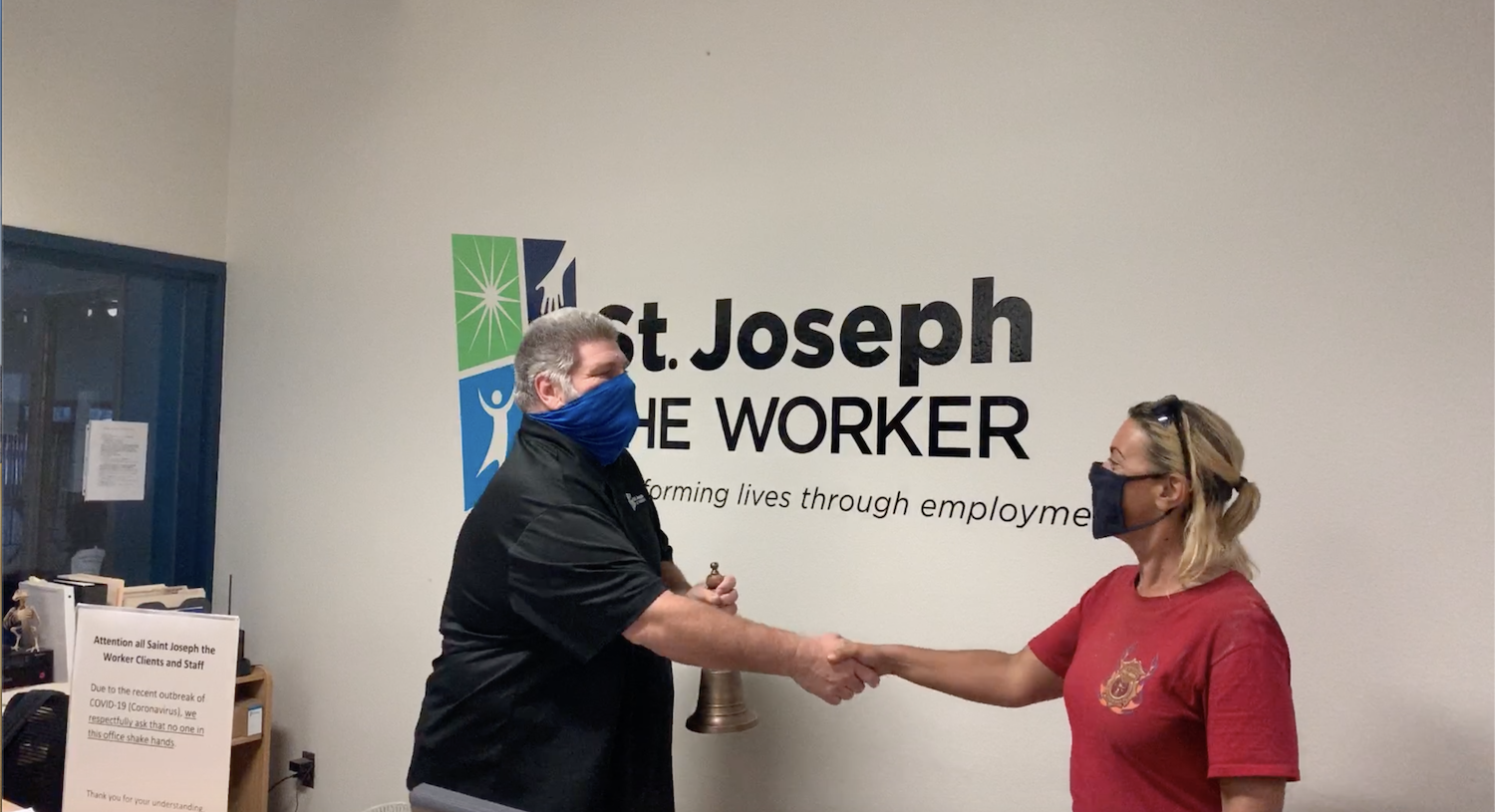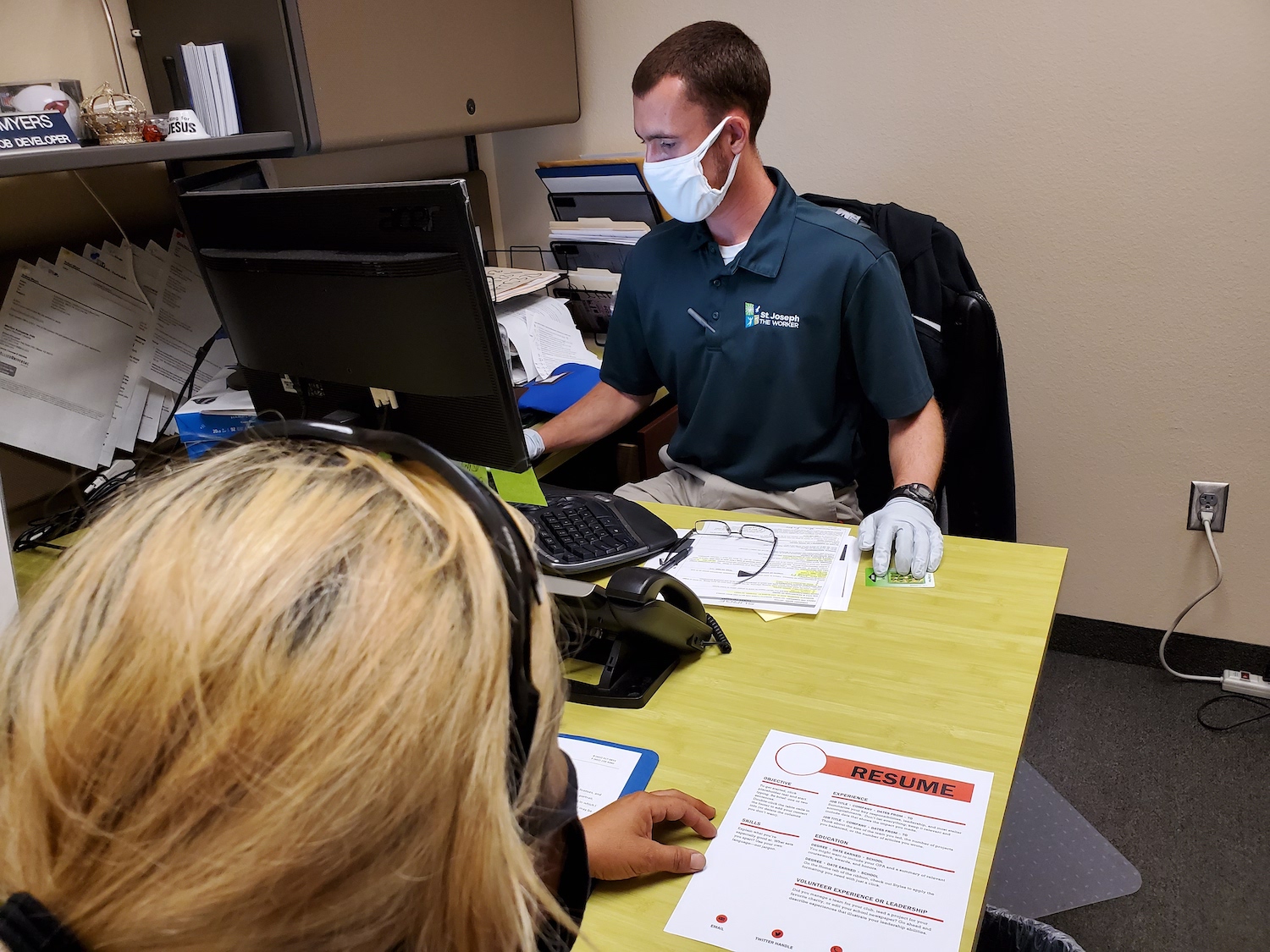

Brent Downs, executive director of St. Joseph the Worker, wants potential donors to the Charity & Development Appeal to know one thing: Their gifts are life-changing.
“We get to see transformation every day,” Downs says. “We see the thousands of people who go from living on the streets to having a job and a safe place to live. We couldn’t do that without the support of the CDA.”
St. Joseph the Worker, located on the Human Services Campus in downtown Phoenix, serves around 3,000 people each year with programs that connect them to employment restores their dignity.
Downs said he understands what clients are facing, and it’s not because he read about it in a book. He was living comfortably, active in his church and retired from the family business at age 33. Then life turned sideways and Downs ended up living on the streets. That was 20 years ago.
“When you’ve been robbed, raped and beaten on the streets, whether you’ve been there a day, a year, a month, that’s trauma that sticks with you,” Downs said. God helped him, he said, but he carries the trauma with him to this day.
When you give to the Charity & Development Appeal you support the work of more than 70 organizations and ministries throughout the Diocese of Phoenix, transforming the lives of thousands of people. Together, we can put our faith into action. Together, we can do more than any one parish or person can do. Your love gives hope to so many!
“That’s the passion that drives, the reason I want to help — I want to help because I’ve been there.”
At SJW, clients have access to a computer lab where they can develop a resume, fill out job applications and establish an email account. They can also visit the clothing closet to find appropriate attire for work. A whole team of people, including volunteers, is devoted to helping each client in their journey toward employment.
There’s a job-readiness class and one-on-one mock interviews, transportation and the ability to connect with employers.
Olivia Martinez, client engagement specialist, walks clients through much of it. She graduated from Fordham University last year and is now in the midst of a year-long commitment to SJW, serving in the Jesuit Volunteer Corps.
Martinez vividly remembers one client, a woman she later realized was about her same age. The woman’s parents kicked her out of the house when she was 16 and she’d been living on the streets for eight years. She was pregnant and unemployed.
“She told me that I was one of the first people in the eight years since she’s been living on the streets who took the time to know her and her story without judgement and with a lot of compassion.”
It’s that kind of compassion at SJW that transforms lives.
Downs recalled a former client he ran into on the Human Services Campus a few years ago. He was surprised to see her there and asked about her job. The woman told him she was still working but had the day off and was on campus to secure housing.
“Then she stopped and she looked me in the eye and she said, ‘It’s the first time in five years I didn’t have to sell my body for a place to sleep.’ It just rocked me to my core.”
Downs also spoke of a client who sat in his office, downcast and saying he had nothing to offer a potential employer. The man was imprisoned at 18 and served time until he was 42.
“When he got that job and he got that paycheck, his whole life changed.”
“So I said, ‘Were you one of those prisoners that just sat in his cell and stared out the bars?’”
Turns out the man had spent five years washing dishes in prison. Not only that, but he had 12 years’ experience as a line cook in the prison kitchen and five years as a supervisor. Downs helped the man write a resume where he listed each of those positions with the Arizona Department of Corrections.
“I told him, ‘You have management experience.’ He started lightening up and telling me stories. I told him I’d never been to prison but was pretty sure it wasn’t easy to manage an incarcerated workforce.” The man secured a job.
“When he got that job and he got that paycheck, his whole life changed.”

SJW, Downs said, wants clients to know that there are opportunities for them to work themselves out of poverty and homelessness. The organization has gone from helping 300 people a year at its inception in the basement of nearby André House 30 years ago to a $2.2 million dollar non-profit that today serves thousands.
“We want to remove every single barrier a person has to going back to work,” Downs said.
Martinez said SJW realizes each client is an individual who deserves to be treated with respect.
“We’re not there as some savior thinking that only because of us are these people able to succeed. We really want to instill in them that they have the skills and the capabilities,” Martinez said. “Sometimes we help them pull that out of themselves by talking to them and getting them to realize what they’re capable of.”
The lifesaving work of SJW costs money, and the organization doesn’t receive any public funding.
“We can’t do it alone. We can have all have that passion but without those folks out there praying for us and supporting us, we wouldn’t be where we are today,” Downs said.





